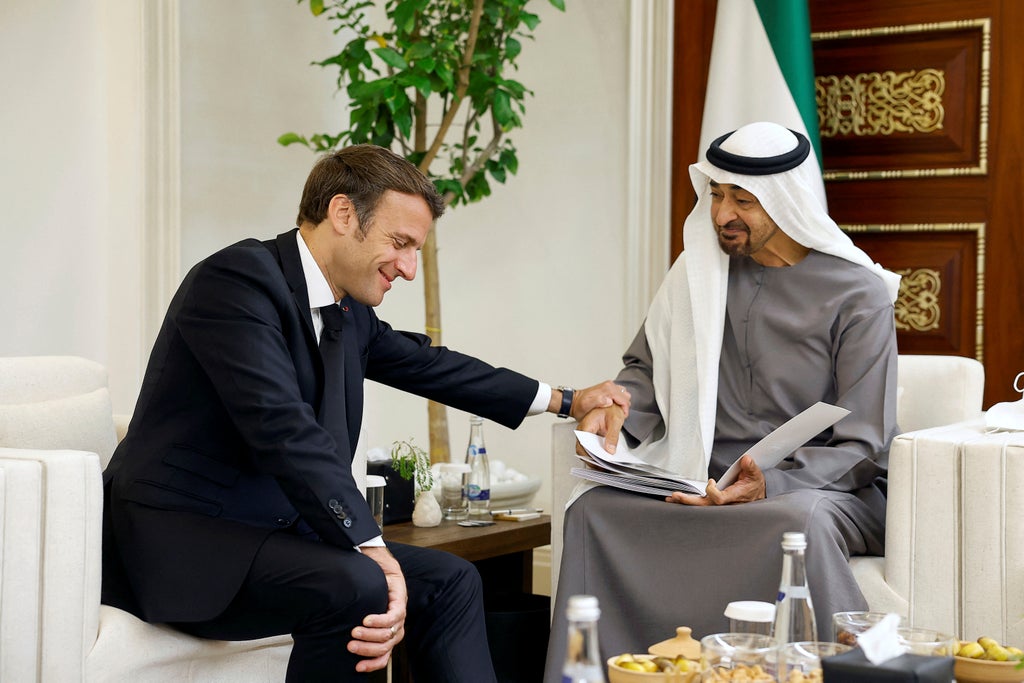
An array of presidents and prime ministers continued to descend on the United Arab Emirates from around the world Sunday to pay their respects to the federation's late ruler. They also came to praise his successor, Sheikh Mohammed bin Zayed Al Nahyan — a vivid sign of Abu Dhabi's influence in Western and Arab capitals.
The first Western leader to jet to the oil-rich capital of Abu Dhabi was French President Emmanuel Macron. He met Sunday with Sheikh Mohammed to pay tribute to Sheikh Khalifa bin Zayed Al Nahyan, the country's long-ailing ruler who died on Friday at the age of 73.
British Prime Minister Boris Johnson was expected to arrive later Sunday to offer condolences, along with other leaders including Israeli President Isaac Herzog after the two countries opened formal relations in 2020.
An American delegation led by Vice President Kamala Harris is due to visit the UAE on Monday, a bid to show support after relations between the countries have recently strained.
Arab heads of state, including close allies Egyptian President Abdel Fattah el-Sissi and Jordan’s King Abdullah II traveled to the UAE on Saturday.
“He was respected by all for the values of peace, openness and dialogue that he embodied,” Macron wrote on Twitter of Sheikh Khalifa, expressing “full support” for the ascension of his half-brother Sheikh Mohammed after rulers in the federation unanimously appointed him as president.
As crown prince of Abu Dhabi, Sheikh Mohammed has served as the nation’s de facto leader since Sheikh Khalifa suffered a stroke in 2014. He has turned the small UAE into a most influential state, wielding outsized power militarily and commercially across the Middle East and Africa.
Even while the country became entangled in the bloody, yearslong conflict in Yemen and a chaotic proxy war in Libya, it positioned itself as a savvy and reliable partner in Western capitals.
Paris and Abu Dhabi have become increasingly aligned in recent years, sharing a deep mistrust of Islamist movements like the Muslim Brotherhood across the wider region, including in Turkey and Libya.
France opened a major overseas naval base in Abu Dhabi. French warplanes and personnel are also stationed at a major facility outside the Emirati capital. The two governments jointly built a gleaming branch of the Louvre museum in the emirate.
During Macron's visit to Dubai last December, France clinched its biggest overseas order for its Rafale combat jet with the UAE — an $18 billion deal that came as a planned U.S. sale of advanced F-35 fighter jets to the UAE stalled in part over American concerns about the Emirates’ relationship with China.
The assertive foreign policy of Sheikh Mohammed was on stark display as allied Arab leaders rushed to the capital to express their sorrow over Sheikh Khalifa's death and offer congratulations on his formal ascension to power. Among the first was el-Sissi, the Egyptian general who, with Gulf Arab support, overthrew an elected but divisive Islamist government in 2013.
Emirati-backed Tunisian President Kais Saied, who has amassed nearly absolute power in the country since dismissing the prime minister last year, also flew in to pay tribute, along with Iraq's president and prime minister.
Sudan's Abdel-Fattah Burhan, the general who led the coup in the strategic east African nation last year, has made frequent visits to key backer Sheikh Mohammed. He posted footage on social media Saturday sprinting up stairs to board his plane to Abu Dhabi to give tribute to the late president.







